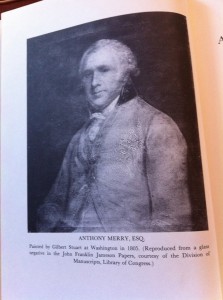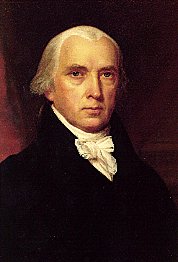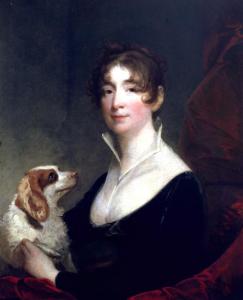Thomas Jefferson was a sophisticated gentleman, not usually associated with rudeness, but…
President Jefferson’s Hosting Attitudes
Thomas Jefferson (1743-1826) had grown up in a time and place of elegance and form. As a young student at William and Mary, he was a frequent guest at the Governor’s Palace, where fine dining and fine manners were matter of course in Williamsburg, the capital of the Virginia colony.
In due time, he himself was Governor of Virginia (not a colony, not yet a state), and even with the Revolutionary War in full throttle, managed to entertain cordially from time to time.
His half-decade or more in Europe, particularly in France, exposed him to the crème de la crème of social settings. When he returned to the United States as President Washington’s Secretary of State, he earned a well deserved reputation of hosting some of the finest dinners. His estate at Monticello, of course, bespeaks the man himself.
Perhaps the most important facet of Jefferson’s style of hosting was that he was a man of the “small” table. He did not care for the European (and later Federalist style) of large levees or receptions, and did not continue the traditions of the Washingtons or Adamses. Frequent dinners for twelve, or perhaps as many as twenty, was far more agreeable to him. This insured interesting conversation enjoyed by all. There could be some active politicking as well, since he chose his guest lists carefully, never mixing Federalists and Democrats, or cabinet members with congressmen. But the food was always delicious and served with elegance. The wine was invariably superb.
Anthony and Elizabeth Merry
Anthony Merry (1756-1835) had been appointed Minister from Great Britain to the recently United States. He had already enjoyed two decades in various European diplomatic posts, and it has been inferred that Merry considered his assignment to upstart America in 1803 as some kind of punishment. His wife Elizabeth definitely believed this backwater country to be beneath them.
Most of the Americans who became acquainted with the Merrys considered them snobbish, stiff, unfriendly, pompous, and a few other choice adjectives of the same genre.
When the Merrys arrived, Washington was a muddy, unpaved, half-finished town. They moved into the largest house they could rent, along with wagons loaded with their sumptuous belongings. Ambassador Merry (using the word in its modern sense, since the term “Ambassador” was not formally used until McKinley’s time) presented his credentials to Secretary of State James Madison, who arranged to introduce him to President Jefferson the following day.
Merry bedecked himself in his most formal attire, complete with ribbons, sashes, gold braid and a sword, and accompanied Secretary Madison to the White House. Jefferson did not greet them, nor did he have them received in a formal reception room. Instead, the visitors had to go looking for the President, and finally found him in a small study, in “a state of undress” (a term that connoted informal, and thus unsuitable clothing) with “shoes that were run down at the heels” – or more or less slippers. The Ambassador was dumbstruck, and surmised that Jefferson’s actions in dress and presence was a deliberate insult. He may have been right.
Jefferson had little fondness for the British, and was well known to be a Francophile. He was also a man who wished to instill democratic (small ‘d’) traditions in the American government, which included the social sphere as well.
Nevertheless, President Jefferson extended an invitation to Ambassador and Mrs. Merry to be his guests at a White House dinner a day or two later. Merry got over his miff and accepted, assuming he would be the guest of honor. After all, he was the official representative of Great Britain, the most powerful country in the world.
The Dinner, Pell-Mell and The Un-merry Merrys
Anthony and Elizabeth Merry, bejeweled and dolled up in their very finest clothes, came to the White House at the appointed hour, and assembled with a small contingent of other guests. One of those guests was the French Ambassador. Merry was apoplectic. England and France were at war, and had been at war for years (if not for centuries). It was another insult.
Then, the widowed President Jefferson, who was expected to give his arm to Mrs. Merry as matter of courtesy, gave his arm to Mrs. Madison, who frequently served as his hostess, and escorted her to the round table in the dining room. There was no official or planned seating arrangement. Round tables have neither head nor foot, thus precluding seating honors. Secretary Madison graciously gave his arm to Mrs. Merry, leaving Mr. Merry perplexed. Where should he go? The rest of the guests escorted themselves to the table, sitting wherever they chose. Merry wound up sitting wherever there was an empty chair. He was livid.
Jefferson charmingly explained that this was the “new fashion” of pell-mell. Sit wherever you like. It did not sit well with the Merrys, and they couldn’t wait to leave. They believed they were being deliberately insulted by Jefferson’s coarse and ungracious behavior, and despite whatever fine food and wine might have been served, they did not care. International incidents have been created with much less provocation.
The Merrys never accepted another invitation at the White House.
Sources:
Allgor, Catherine, – Parlor Politics: In Which the Ladies of Washington Help Build a City and a Government, 2000, University of Virginia Press
Allgor, Catherine – A Perfect Union: Dolley Madison and the Creation of the American Nation – 2006 Henry Holt and Company







That’s what happens when you think you are better than everyone else. sd
Reblogged this on Lenora's Culture Center and Foray into History.